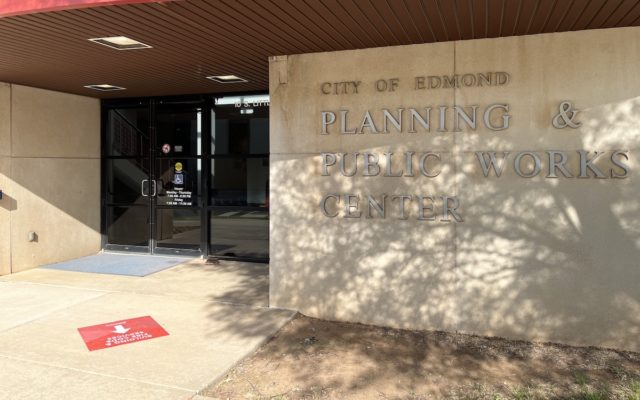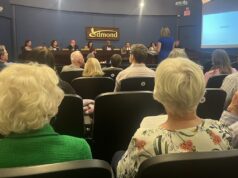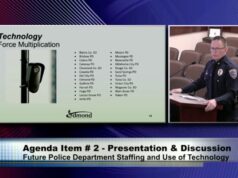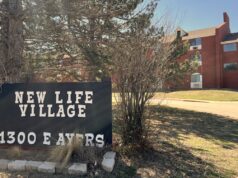An Oklahoma County District Court judge has ruled in favor of the City of Edmond in a case about whether the Edmond Planning Commission acted in an “arbitrary or capricious manner” when denying approval of a developer’s preliminary plat for a 110-acre property in November 2018, despite the plat meeting regulations required in the city’s code.
“The court finds that the evidence as applied to the law concludes that the defendant, City of Edmond, did not act in an arbitrary or capricious manner — one, in making the determination to deny the latest application — and two, that the City of Edmond, defendants, did not rely upon arbitrary standards,” Judge Richard Ogden said Wednesday.
David Box, an attorney representing the developer, SACC Investments-Moyer 10 LLC, told NonDoc his client plans to appeal the ruling to the Oklahoma Supreme Court.
“We believe that the Planning Commission was incorrect in their decision. We believe that the Courts of Civil Appeals’ opinion was very clear that it is a quasi-judicial function in its analysis of ordinances, and that in our opinion, the testimony made clear that the ordinances were met,” Box said. “Every witness that came to the witness stand testified under oath that all ordinances were met.”
Stephen Murdock, Edmond city attorney, said the city is “pleased with the court’s ruling” to uphold the Planning Commission’s denial of the preliminary plat.
J. Kelly Work, an attorney representing the intervenors — a group of homeowners who live adjacent to the proposed Arcadia Peak property — provided a statement praising Ogden’s ruling.
“The proposed subdivision was too dense, made no provision for appropriate transition and buffer from the surrounding neighborhoods, lacked amenities, failed to address preservation of the remnant forest on the property and was not compatible with the area,” Work wrote. “Our hope is that the developer will now give careful consideration to revising its plans for the property to be something more thoughtful and suitable for the area, with transitions and preserving natural spaces, and providing needed amenities for the people who will live there.”
‘So why are we involved?’
On Nov. 20, 2018, SACC Investments-Moyer 10 LLC’s previous attorney, former Edmond Mayor Randel Shadid, asked the Edmond Planning Commission to approve a preliminary plat, which subdivided a 110-acre property — that would be Arcadia Peak — into 451 residential lots averaging 6,000 square feet per lot. The property, which contains areas of remnant forest, is south of Coffee Creek Road and west of Midwest Boulevard.
Although the plat met all of the city’s zoning codes and requested no variances from the city’s zoning requirements, the Planning Commission unanimously denied the application by a 4-0 vote.
Prior to the Edmond Planning Commission’s denial of the plat, city staff recommended approval of the plat based on a technical evaluation. However, staff recommendations are advisory only, meaning the Planning Commission still held final approval authority over the plat.
During the Nov. 20, 2018 meeting, observers caught a glimpse of the eventual lawsuit’s primary arguments.
“I’m saying we have met all those items. I think staff is saying we have met all those items, and having met all those items, you are required at that point to approve the plat,” Shadid said to the Edmond Planning Commission. “You have to decide whether we’ve met them or not.”
Rob Rainey, planning commissioner, disagreed with Shadid.
“What you’ve described is a ministerial process, an administrative process,” Rainey said.
Shadid confirmed Rainey’s assertion.
“That is exactly what it is,” Shadid said.
Rainey then posed a rhetorical question to Shadid.
“So why are we involved?” Rainey asked. “The city staff could approve this and we wouldn’t be having this argument.”
‘Arbitrary, capricious and unreasonable manner’
Following the plat’s denial in November 2018, SACC Investments filed a lawsuit against the city in December 2018. In March 2019, SACC Investments’ legal counsel filed a motion for summary judgement and a brief in support, arguing that the Planning Commission’s review of the plat was a “ministerial inquiry.” They also argued that, because the plat complied with all regulations, the Planning Commission’s denial was “erroneous as a matter of law.”
Additionally, SACC Investments’ legal counsel argued that the city’s “Planning Commission acted in an arbitrary, capricious and unreasonable manner by denying the plat.”
In response to SACC Investments’ attorneys’ brief, the City of Edmond’s defense counsel argued that the Planning Commission’s denial of the plat was not “unreasonable nor arbitrary,” and that the “Edmond Planning Commission had discretion to approve or deny the preliminary plat since the issues presented were fairly debatable.”
During the Nov. 20, 2018 planning commission meeting, Work provided a letter of protest with an itemized list of concerns that the homeowners he represents had with the proposed plat. Specifically, the letter said the proposed development would be “overly dense, too congested, fails to make adequate provisions for recreation, light and air; the surrounding area is characterized by larger residential lots; there is no provision for tree preservation; and there is a lack of any type of buffering or transition from the surrounding properties,” according to the City of Edmond and Edmond Planning Commission’s November 2021 trial brief.
During that meeting, Planning Commission Chairman Barry Moore and Commissioner Rainey said they felt the plaintiff’s plat did not meet the burden required for compatibility with the surrounding area.
Also in the City of Edmond and Edmond Planning Commission’s trial brief is citation of Edmond Plan IV, a comprehensive land use plan that was adopted in 2007 and updated in 2018. City of Edmond attorneys cited pages stating that “conservation of valuable environmental areas such as remnant forests, farmland and flood plains is an important goal of Edmond Plan IV,” and that “the Edmond Plan IV should be actively utilized in making development related decisions,” which includes plat approvals or denials.
Legal counsel for SACC Investments-Moyer 10 also referenced Edmond Plan IV throughout their filings, stating that the city’s ordinance plan within Edmond Plan IV designates the plaintiff’s property as “single family residential.” They said the proposal would comply with that designation.
Additionally, SACC Investments-Moyer 10’s legal counsel wrote that the plaintiff’s property complies with its “suburban mixed use” designation under the general plan — another plan within the Edmond Plan IV — that is characterized by “low and medium intensity development consisting of primarily single-family subdivisions.”
In August 2019, Judge Thomas Prince awarded summary judgement to the City of Edmond, Edmond Planning Commission and the intervenors. Following the awarded summary judgement, the plaintiffs filed a petition in error to the Oklahoma Court of Civil Appeals in September 2019.
In November 2020, OCCA Judge Kenneth Buettner reversed and remanded the decision back to the Oklahoma County District Court for fact-finding.
“Because the commission’s review of a preliminary plat involves the investigation of facts and the application of relevant laws in order to determine whether to approve or deny, we hold that such a review is quasi-judicial in nature. As such, we will reverse only where such decision is shown to be arbitrary, capricious, or otherwise contrary to law,” Buettner opined. “Because the trial court erred in granting summary judgment to city when a dispute of material fact remained regarding whether the commission’s action on the plat was arbitrary and capricious, or where inferences on the undisputed facts favored Company, we reverse for further proceedings consistent with this opinion.”
Follow NonDoc on:
Ogden’s ruling
At the district court level, the case was reassigned because Prince had been appointed to the Oklahoma Court of Civil Appeals by Gov. Kevin Stitt on Dec. 18, 2020. (Prince filled Buettner’s seat on the bench after his retirement.) For the purpose of the new trial, the case was assigned to Judge Richard Ogden.
In February 2022, the bench trial started, and it concluded April 7. The ruling was delivered by Ogden on April 20.
As Ogden announced his ruling, he stated that the Court of Civil Appeals did not consider the comprehensive Edmond Plan IV for the sake of evidence, “even though it may have been adopted in the form of an ordinance.”
Ogden admitted that he did not agree with OCCA’s decision.
“It seems like the intended purpose of the comprehensive plan would be that it’d be considered in instances like this,” Ogden said. “But I make the point that it’s not something that the Court of Civil Appeals would allow me to consider in determining whether or not the City of Edmond relied on arbitrary standards.”
Ogden said the Nov. 20, 2018, meeting showed that the Planning Commission did deliberate on the preliminary plat’s compatibility with the surrounding area.
Ogden said the Planning Commission is allowed to consider the “more subjective standards,” naming four items.
“One, positive impact on the surrounding areas. Two, safety and convenience of persons residing in the area. Three, if the preliminary plat would have a positive impact on the public health and safety, and also four, if the subdivision design aesthetically minimizes an impact on the surrounding subdivisions or established areas,” Ogden said.
Ultimately, Ogden ruled in favor of the City of Edmond.
“From review of the minutes of Nov. 20, 2018, and the evidence presented at trial, the court finds that the plaintiff has failed to prove that the city acted in a manner that is willful and unreasonable,” Ogden said.






















